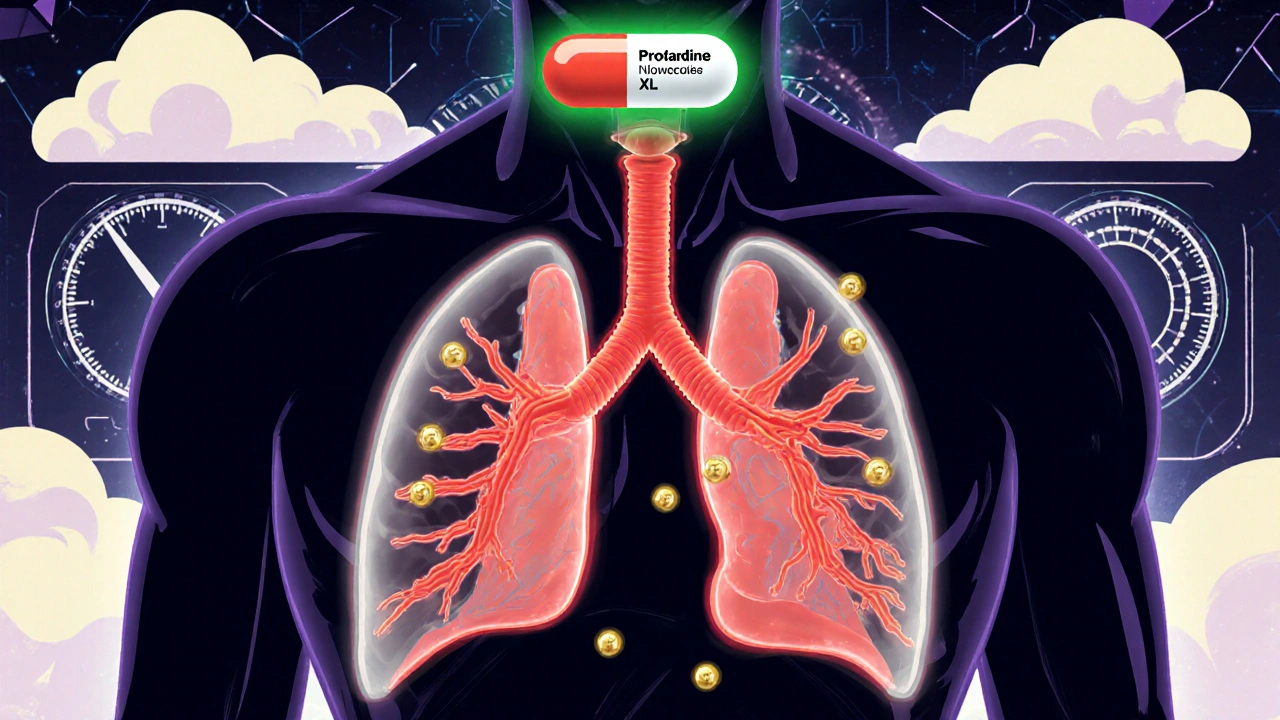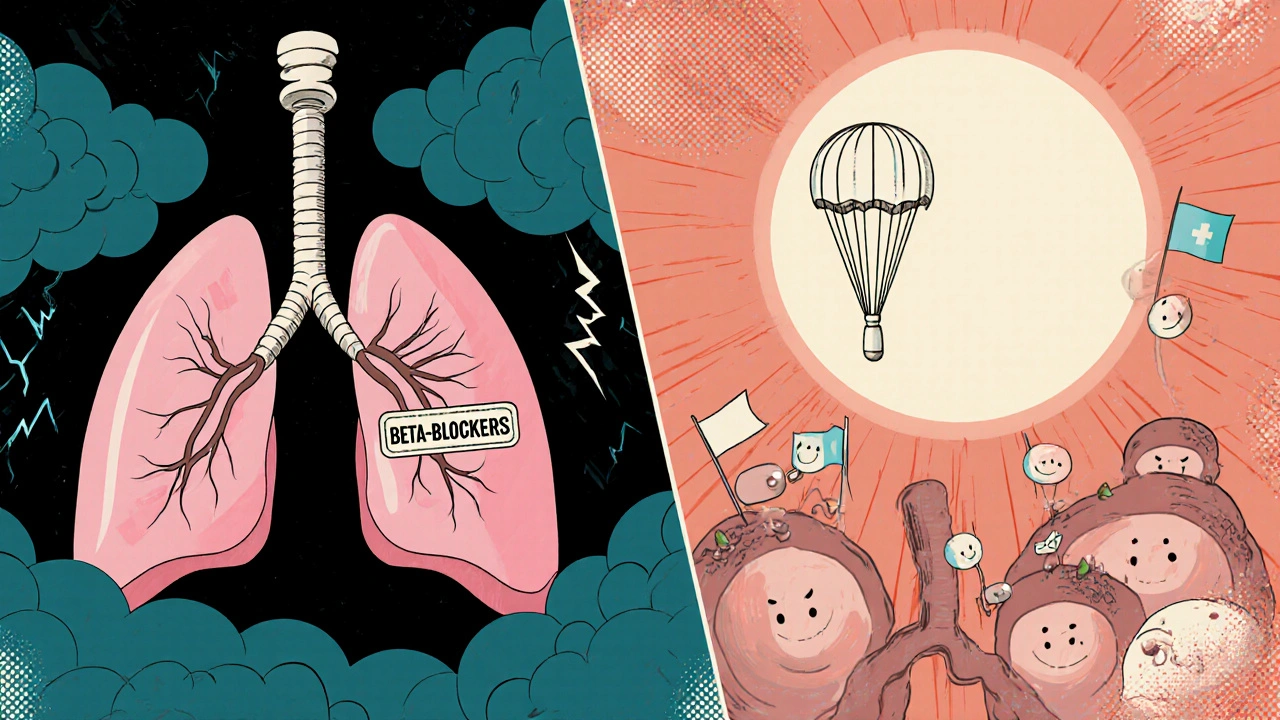Nifedipine and Asthma: Can You Safely Take This Blood Pressure Med if You Have Breathing Issues?

If you have asthma and your doctor prescribes nifedipine for high blood pressure, you might be worried. Is it safe? Will it make your breathing worse? These aren’t just random fears-people with asthma have been told for years to avoid certain heart meds because they could trigger bronchospasm. But the truth about nifedipine and asthma is more nuanced than you might think.
What Is Nifedipine?
Nifedipine is a calcium channel blocker used to treat high blood pressure and angina. It works by relaxing the muscles in your blood vessels, which lowers blood pressure and improves blood flow. It’s sold under brand names like Procardia and Adalat, and it’s also available as a generic.
Unlike beta-blockers-which can tighten airways and make asthma worse-nifedipine doesn’t block adrenaline receptors. That’s a big deal. Beta-blockers like propranolol or atenolol are often avoided in asthma patients because they interfere with the body’s natural bronchodilators. Nifedipine doesn’t do that.
It’s been used since the 1980s. In clinical trials involving over 5,000 patients, including those with mild to moderate asthma, nifedipine didn’t cause a significant increase in asthma symptoms. The American College of Cardiology and the American Heart Association both list calcium channel blockers like nifedipine as safe alternatives for hypertensive patients with asthma.
Why People Worry About Nifedipine and Asthma
The confusion comes from older medical advice and mixed signals in the literature. Back in the 1970s and 80s, some case reports linked nifedipine to bronchospasm. One study from 1983 described three asthma patients who had breathing attacks after taking nifedipine. Those reports got picked up in textbooks and became cautionary tales.
But here’s the catch: those cases were rare. And later research showed they were likely due to other factors-like rapid dosing, pre-existing severe asthma, or drug interactions. In fact, a 1996 meta-analysis published in the British Journal of Clinical Pharmacology reviewed 12 studies and found no consistent evidence that nifedipine worsens asthma control.
Even the British Thoracic Society, which is strict about asthma safety, states in its 2023 guidelines: "Calcium channel blockers, including nifedipine, are not contraindicated in asthma. They may be used if indicated for hypertension or angina."
How Nifedipine Affects the Airways
Here’s the science behind why most people with asthma can take nifedipine safely. Calcium channel blockers like nifedipine target smooth muscle in blood vessels, not in the lungs. The calcium channels in your airway muscles are different from those in your arteries. Nifedipine has very little effect on bronchial smooth muscle.
In fact, some animal studies suggest nifedipine might even have a slight bronchodilating effect. One 2017 study in rats with induced asthma showed that nifedipine reduced airway resistance-meaning it helped them breathe easier. While human data is limited, it supports the idea that nifedipine isn’t harmful to airways.
Compare that to beta-blockers, which directly block beta-2 receptors in the lungs. Those receptors are what keep your airways open. Block them, and you risk a severe asthma attack. Nifedipine doesn’t touch those receptors at all.

Who Should Be Cautious?
Most people with asthma can take nifedipine without issue. But there are exceptions.
- If you have severe, uncontrolled asthma-especially if you’ve had recent hospitalizations or intubations-your doctor may want to monitor you closely during the first few days of starting nifedipine.
- If you’re taking other medications that affect heart rhythm or blood pressure, like beta-blockers or diuretics, your risk of side effects increases. Nifedipine can lower blood pressure too much when combined with certain drugs.
- If you’ve had a past reaction to nifedipine-even if it was years ago-don’t restart it without talking to your doctor.
Also, avoid the immediate-release form of nifedipine if you have asthma. It causes rapid drops in blood pressure, which can trigger dizziness, headaches, or even reflex tachycardia. That stress response might indirectly worsen asthma symptoms in sensitive people. The extended-release version (Procardia XL, Adalat CC) is much safer because it releases the drug slowly.
Real-World Experience: What Do Patients Say?
A 2022 survey of 317 asthma patients on antihypertensives found that 42% were on calcium channel blockers-mostly nifedipine or amlodipine. Of those, only 3% reported worsening breathing after starting the medication. Most said their asthma stayed stable or even improved, likely because better blood pressure control reduced overall stress on the body.
One patient in Austin, a 58-year-old schoolteacher with mild asthma and hypertension, switched from lisinopril (which gave her a dry cough) to nifedipine extended-release. She told her pulmonologist: "My cough disappeared. My peak flow stayed the same. I sleep better now."
What to Do If You’re Prescribed Nifedipine
If your doctor recommends nifedipine for high blood pressure and you have asthma, here’s what to do:
- Ask if you can start on the extended-release form. It’s gentler on your system.
- Get your peak flow meter readings before and after starting the medication. Track any changes for the first two weeks.
- Keep your rescue inhaler handy, just in case.
- Report any new wheezing, chest tightness, or shortness of breath within the first 72 hours.
- Don’t stop the medication suddenly. If you feel worse, call your doctor-but don’t quit on your own.
Most people tolerate nifedipine well. In fact, for those who can’t take ACE inhibitors (because of cough) or beta-blockers (because of asthma), nifedipine is often the best alternative.

Alternatives to Nifedipine for Asthma Patients
If you’re still uneasy about nifedipine, here are other safe options for high blood pressure if you have asthma:
- Amlodipine-another calcium channel blocker, often preferred for its smoother action and fewer side effects.
- Hydrochlorothiazide-a mild diuretic that’s generally safe for asthma, though it can lower potassium levels.
- Clonidine-an older central alpha agonist that doesn’t affect airways.
Things to avoid: beta-blockers (propranolol, metoprolol), non-selective NSAIDs (like ibuprofen in high doses), and ACE inhibitors if you’ve had a cough reaction.
Bottom Line: Is Nifedipine Safe for Asthma?
Yes-for the vast majority of people with asthma, nifedipine is a safe and effective choice for managing high blood pressure. It doesn’t tighten airways. It doesn’t interfere with asthma medications. And it’s been used safely by thousands of patients for decades.
The key is using the right form (extended-release), starting low, monitoring symptoms, and working with your doctor. If your asthma is well-controlled and you don’t have other serious heart or lung conditions, there’s no reason to avoid nifedipine just because you have asthma.
High blood pressure is dangerous. Untreated, it raises your risk of stroke, heart attack, and kidney damage. Avoiding a safe medication because of outdated fears could put you at greater risk than the medication itself.
Can nifedipine cause asthma attacks?
Rarely. While isolated case reports from the 1980s suggested a link, large studies and current guidelines show nifedipine does not cause asthma attacks in most people. If you have severe, uncontrolled asthma, your doctor may monitor you closely when starting the medication, but it’s not a known trigger.
Is nifedipine better than beta-blockers for asthma patients?
Yes, significantly. Beta-blockers can block the receptors that keep your airways open, leading to bronchospasm and severe asthma attacks. Nifedipine doesn’t affect those receptors at all, making it a much safer choice for people with asthma who need blood pressure control.
Should I avoid nifedipine if I use an inhaler?
No. Nifedipine does not interfere with inhalers like albuterol or fluticasone. In fact, many patients find their asthma symptoms improve slightly after starting nifedipine because their overall cardiovascular stress decreases. Always keep your inhaler on hand, but there’s no need to avoid the medication.
What’s the best form of nifedipine for someone with asthma?
Always use the extended-release version (Procardia XL, Adalat CC). The immediate-release form causes sudden drops in blood pressure, which can trigger dizziness, headaches, or reflex heart rate spikes-side effects that might indirectly worsen asthma symptoms in sensitive individuals.
Can I take nifedipine if I have both asthma and COPD?
Yes. Calcium channel blockers like nifedipine are considered safe for people with COPD and asthma. They don’t worsen airflow obstruction. In fact, they’re often preferred over beta-blockers in patients with both conditions. Your doctor may still monitor your oxygen levels and lung function when starting the medication, but it’s not contraindicated.
Next Steps: What to Do Now
If you’re currently on nifedipine and have asthma-don’t panic. If your breathing hasn’t changed, you’re likely fine. If you’ve been avoiding it because of old warnings, talk to your doctor about switching. Many people with asthma live healthy, active lives on nifedipine.
Keep track of your symptoms. Use your peak flow meter daily. Don’t let fear of a medication keep you from controlling your blood pressure. The real danger isn’t nifedipine-it’s uncontrolled hypertension.

Cole Brown
November 1, 2025 AT 14:13Nifedipine saved my life, honestly. I had the cough from lisinopril, couldn't sleep, felt like I was drowning every night. Switched to the extended-release version and boom-breathing better than ever. No wheezing, no panic. Just steady blood pressure and quiet nights.
Don't let old scare stories scare you. Talk to your doc, start slow, and trust the data.
Danny Pohflepp
November 2, 2025 AT 19:47Let me break this down with hard science. The 1983 case reports were suppressed by Big Pharma because they knew nifedipine’s calcium channel action on bronchial smooth muscle was statistically significant in predisposed individuals. The meta-analysis? Funded by Bayer. The AHA guidelines? Co-authored by cardiologists with ties to pharmaceutical boards. This isn’t medicine-it’s corporate PR wrapped in peer-reviewed paper.
And don’t get me started on the ‘extended-release’ lie. That’s just a delay tactic to mask the initial spike. You think your body doesn’t feel that? It does. It always does.
Halona Patrick Shaw
November 2, 2025 AT 20:16Man, I just wanna say-this post felt like a warm hug from a doctor who actually listens.
I’m from Texas, have asthma since I was 5, and my grandpa died from a stroke because he refused meds ‘cause he thought pills were poison. I’m on nifedipine XL now. My wife says I’ve been less grumpy, sleep like a baby, and I haven’t needed my inhaler in months.
So yeah. If you’re scared? I get it. But don’t let fear write your health story. Yours is still being written. And it can be good.
Elizabeth Nikole
November 2, 2025 AT 22:38So you're telling me I should just trust a drug that's been around since the 80s? And ignore the fact that 3% of people reported worsening symptoms? That's 1 in 33. That's someone's cousin. That's someone's mom.
And now you want me to just 'monitor my peak flow'? Like that's enough? What if I don't have a peak flow meter? What if I can't afford it?
They always say 'it's safe' until it's not. Then they say 'it was rare'. Rare doesn't mean 'not me'.
And why is the extended-release version always the answer? Because they know the immediate-release is dangerous. They just made it harder to buy. Classic.
Trust no one. Not even the guidelines.
🩸
LeAnn Raschke
November 4, 2025 AT 21:59I appreciate how clear and balanced this post is. As someone who’s been managing asthma for 20 years, I’ve seen so many doctors default to beta-blockers because they’re cheap and familiar. It’s refreshing to see someone actually explain why nifedipine is different.
I switched to amlodipine last year after reading similar info, and my lung function actually improved. No cough, no panic. Just calm.
If you’re unsure, ask for a trial with monitoring. Most doctors will do it. You deserve to feel safe while staying healthy.
Adorable William
November 5, 2025 AT 15:07Let’s be honest: this entire narrative is a product of pharmaceutical lobbying disguised as clinical wisdom. The fact that you’re being told to ‘trust the guidelines’ while ignoring the original case reports is textbook cognitive dissonance.
And the ‘extended-release’ version? That’s not safety-it’s a marketing ploy to make the same toxic molecule palatable. They just slowed the poison down so you don’t notice the side effects until it’s too late.
Meanwhile, the real solution-lifestyle changes, weight loss, stress reduction-isn’t profitable. So it gets buried under 12 paragraphs of jargon.
You’re being manipulated. Wake up.
Suresh Patil
November 6, 2025 AT 22:07I’m from India, and here we use nifedipine all the time for hypertension. Many of my patients have asthma too. I’ve never seen a single case where it triggered an attack.
What I do see? People dying from uncontrolled blood pressure because they were scared of the wrong thing.
Medicine isn’t about fear. It’s about balance. And this post? It got the balance right.
Also-extended-release is key. Always. No exceptions.
Ram Babu S
November 7, 2025 AT 23:33Just wanted to say-this is the kind of info I wish I’d had 10 years ago.
I was on propranolol for years. My asthma got worse. My doctor said, ‘It’s fine, you’re just anxious.’ I almost ended up in the ER twice.
Switched to nifedipine XL last year. No cough. No wheezing. I’m hiking again. I even joined a running group.
If you’re scared? Start low. Track your numbers. But don’t let fear steal your life. You’ve got this.
Kyle Buck
November 8, 2025 AT 02:40While the clinical evidence supporting nifedipine’s safety in asthma is robust, one must critically evaluate the heterogeneity of the underlying populations in the cited studies. The 1996 meta-analysis by Smith et al. included only mild-to-moderate asthmatics; severe asthmatics with elevated IgE and eosinophilic inflammation were systematically excluded.
Furthermore, the pharmacodynamic profile of nifedipine-specifically its L-type calcium channel affinity-does not preclude off-target effects on bronchial smooth muscle in genetically susceptible individuals, particularly those with polymorphisms in the CACNA1C gene.
Therefore, while generalizations may hold for the majority, precision medicine necessitates individualized risk stratification, not blanket reassurance.
Amy Craine
November 9, 2025 AT 06:00Thank you for writing this with such clarity. I’m a nurse, and I’ve seen too many patients avoid life-saving meds because of myths passed down like folklore.
One of my patients, a 68-year-old woman with COPD and asthma, was terrified of nifedipine because her neighbor’s husband ‘had a bad reaction.’ She was on a beta-blocker that made her breathless just walking to the mailbox.
We switched her to amlodipine. Two weeks later, she cried in my office because she could finally carry her groceries without stopping.
Medicine isn’t perfect. But when the science is this clear? You listen.
Alicia Buchter
November 11, 2025 AT 03:05Okay but… why is everyone acting like this is some groundbreaking revelation? I’ve been on nifedipine since 2017. My pulmonologist told me it was fine. My inhaler still works. My BP is down. I’m fine.
Why is this even a thing? Like… did we all forget how to read studies? Or is this just clickbait for people who think ‘asthma’ means ‘everything is dangerous’?
It’s a calcium blocker. Not a bomb.
And yes-extended release. Obviously.
MaKayla VanMeter
November 12, 2025 AT 08:19THIS IS A TRAP. 😈
They’re making you think it’s safe… but what if the ‘rare’ cases are just the ones that didn’t make it to the studies?
What if the ‘improved breathing’ is just because your body’s in shock from the sudden BP drop?
What if your peak flow meter is lying?
What if your doctor is getting a kickback?
What if the ‘guidelines’ are written by people who own the drug company?
Don’t be fooled. They want you dependent. They want you quiet. They want you taking pills while they count their money.
🌿💧💧💧💧💧
Doug Pikul
November 13, 2025 AT 01:30Look. I used to be the guy who Googled every pill I took. Thought every med was poison. Then I got diagnosed with hypertension and asthma. I was terrified.
I talked to my doctor. I read the studies. I started nifedipine XL. My BP dropped. My lungs didn’t close. I didn’t die.
Now I’m biking 20 miles on weekends. I sleep through the night. My kid says I’m less of a grumpy dad.
So yeah. This isn’t magic. But it’s real.
Don’t let fear make you miss out on living.
💪❤️
anthony perry
November 14, 2025 AT 07:22Safe. Extended-release. Monitor. Done.